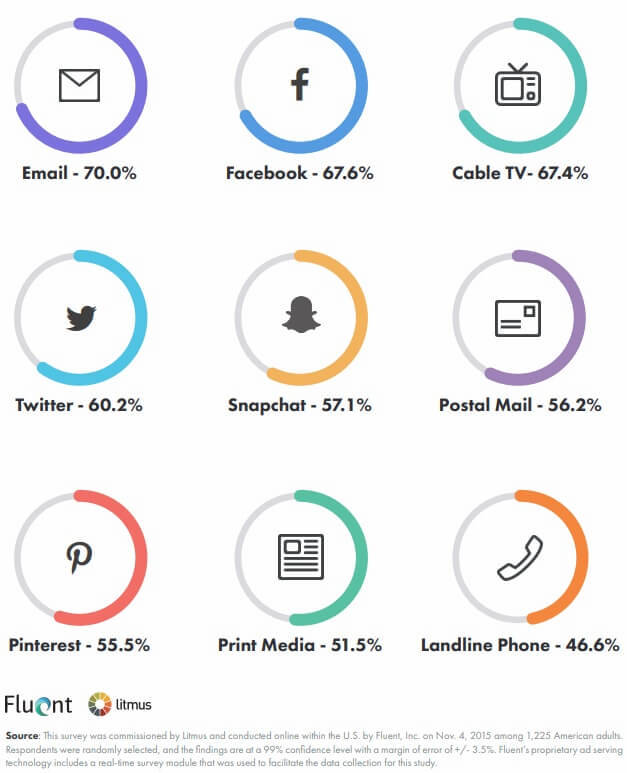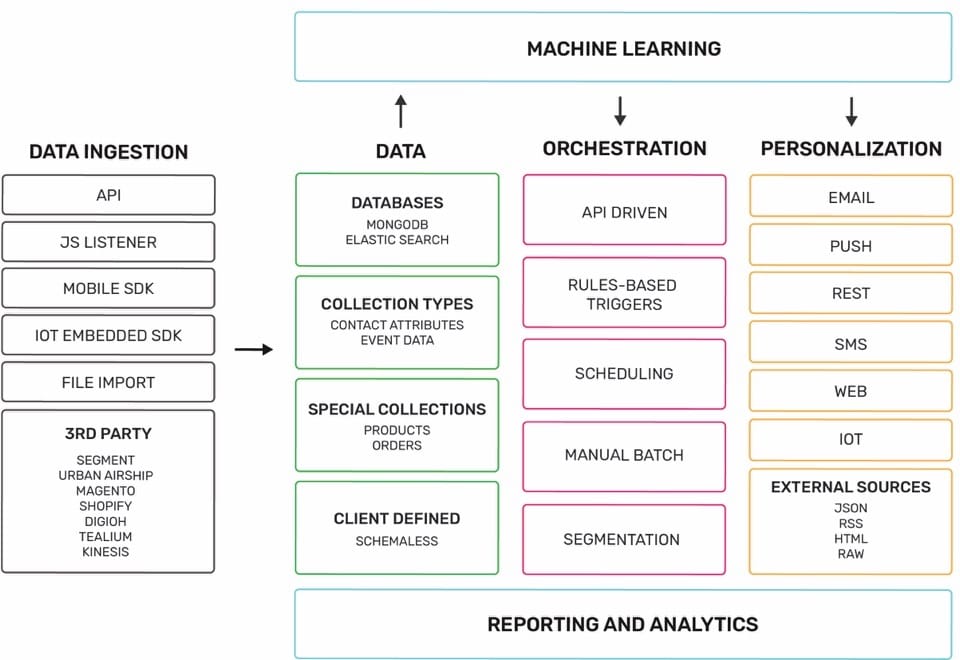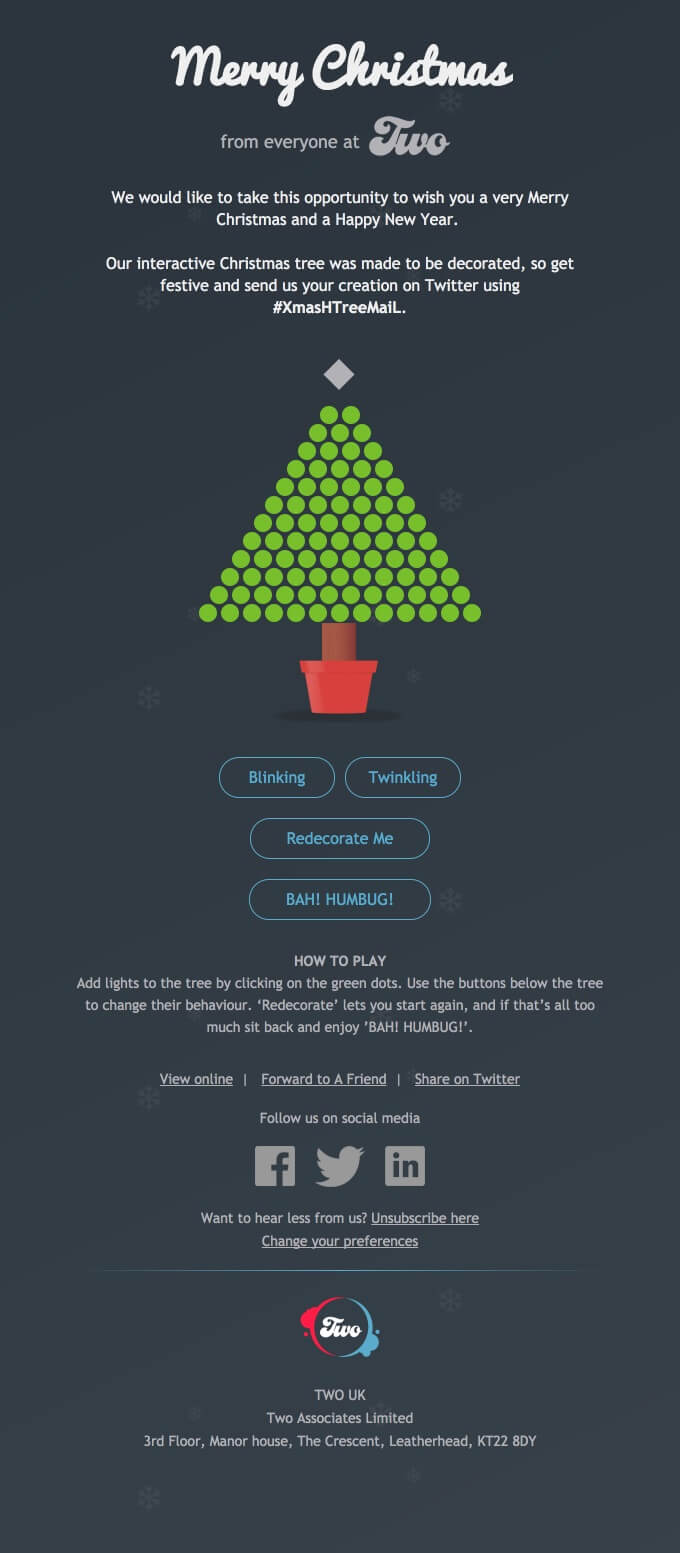Contemplating the future of email marketing seems to be ever-present in the digital marketing news. And more and more marketers are coming to the same conclusion: Email marketing is the hot ticket to gaining and retaining customers.
Email marketing is expected to continue to gain momentum over the next few years and even outlast some of the newer marketing channels being used today.
During a recent study, we asked hundreds of small businesses where they see the most potential when it comes to gaining new clients and building brand awareness, and while social media came in first and email marketing came in a close second, it’s interesting that consumers don’t view social media in the same light. At least not for the long run.
The good people over at Litmus recently surveyed consumers and asked which marketing channels they believed would be relevant in the next 10 years. Email marketing came out on top.
Source: Litmus
Yes, the face of digital marketing is everchanging. However, email marketing remains constant.
Why email marketing still matters
The future of email marketing is very bright, especially since more and more people prioritize checking their email throughout the day, every day. It’s no wonder as our inboxes constantly fill with everything from friendly communications to work messages and yes, marketing content.
According to Statista, in just 2018 alone, there were over 281 billion emails sent and received daily worldwide, and that number is only expected to grow and could reach 293 billion this year. Looking into the future, by 2023, that number is expected to rise to nearly 350 billion emails sent and received daily worldwide.
Here’s another interesting fact to mull over—there are currently around 3.9 billion active email addresses in use as of earlier this year. When you compare that number to the total number of active social media profiles worldwide, 3.5 billion, it’s easy to see why email marketing remains a powerful channel to reach consumers.
Email trends to make a note of now
Email marketing is here to stay; however, that doesn’t mean standards and what consumers want will remain the same. In fact, traditional email campaigns will continue to evolve, and that requires marketing teams to evolve right alongside them in order to continue seeing the return on investment they’ve become accustomed to.
That means marketing teams need to stay up to date on current and future email marketing trends, and to help get you started, we’ve compiled a shortlist of trends that either need to be put on your radar or implemented into your email marketing strategy as soon as possible.
1. Machine learning
Machine learning is one of the most talked-about strategies predicted to take the marketing world by storm, but as a concept, it’s often misunderstood. So what exactly is machine learning, and how can it be applied to email marketing?
Machine learning is a given way to apply an algorithm on top of data to process and make decisions even faster than a human can.
Here’s an example from our friends over at Liveclicker:
Source: Liveclicker
Now, this example can be quite overwhelming—but the good news is, machine learning is capable of taking all that data and using it to help simplify testing and optimization, triggers and automation.
2. Artificial intelligence (AI)
Artificial intelligence has been something to monitor in email marketing for some time, and while some may lump it in with machine learning, it’s an entirely different process.
Yes, AI does take similar data and use it to simplify email marketing, but instead of focusing on optimization, it can create in-depth email personalization. AI can help with not only data segmentation but also content selection and more.
AI and machine learning are two separate entities, but when used together, they create an unstoppable email marketing strategy that delivers the right emails to the right subscribers at exactly the right time.
3. Interactive content
The idea of interactive content in email can be difficult to grasp at first. While plain-text emails have their place in email marketing, more and more brands choose to add interactive content to increase overall reader engagement and provide a surprising and fun experience that keeps your subscribers opening your emails no matter how crowded their inboxes—or their calendars—become.
So, what is interactive content? It’s anything your readers engage and interact with. Interactive content can take several different forms, including but not limited to:
- GIFs
- Videos
- Social sharing options
- Surveys and more
Here’s an example of an interactive email in action from Two UK:
Source: Really Good Emails
In the live version of this email, users were able to click on the options for different lights (blinking or twinkling) and then click on the various green dots that make up the tree to decorate it.
Those that chose the “Bah! Humbug!” option got another little surprise altogether.
4. Loyalty programs
Smart marketers are already implementing loyalty programs into their email marketing strategy. These programs not only bring in new customers but also retain current customers and simultaneously allow your marketing team to collect customer data.
The more behavior you see from your subscribers, the better you can personalize future marketing campaigns for even better results.
These loyalty programs retain customers and show you what kind of content drives engagement with your most diehard fans. That way, you can do more of what works. For instance, you can learn:
- What promotions work best
- Best send times
- What content readers interact with the most and more
Once you collect this information, marketing teams can implement these strategies across your email marketing program to convert more subscribers into VIPs and repeat customers.
5. Quality over quantity
Quality over quantity applies to most marketing efforts. If you send out a poor-quality message, it doesn’t matter how many times that message is read because it won’t be relevant or sit well with your audience.
The same concept applies to the future of email marketing: It doesn’t matter if you message your subscribers daily, weekly, monthly, or yearly if your content isn’t the best quality.
People subscribe to your emails for answers to their questions, product news, and other relevant information. If you don’t send subscribers what you promised or deliver value directly to their inbox, the chances of them unsubscribing from your list are high.
That’s not to say you can’t curate content within your niche, you simply must make sure the content you send is relevant to their wants and needs.
6. Personalization is here to stay
Finally, the future of email marketing will rely heavily on email personalization. Simply sending out mass emails to everyone on your email subscriber list doesn’t cut it anymore. In fact, emails with a personalized subject line are 26% more likely to be opened while 74% of marketers have stated that targeted personalization in emails increases overall customer engagement.
Here are a few reasons why email personalization is here to stay:
- Personalized emails stand out in a crowed inbox because they represent highly relevant, tailor-made material.
- Personalized emails help to strengthen customer experiences by sending the right information to the right inboxes at the right time.
Wrap up
The future of email marketing looks brighter than ever, which means that if you haven’t joined the thousands of businesses using this digital marketing channel already, then it’s time to get started.
There is simply no time to waste if you want to experience for yourself why email marketing should be the cornerstone of your digital marketing strategy:
- Email marketing continues to be one of the best channels for building authentic connection with your audience.
- Email marketing allows you to speak directly to your customers without relying on pay-to-play posts or shifting algorithms.
- Automation and segmentation save you so much time that you could actually spend less time on marketing while making more money than ever before.
Ready to start building your next great email marketing campaign? Then contact Campaign Monitor today for your live demo!









